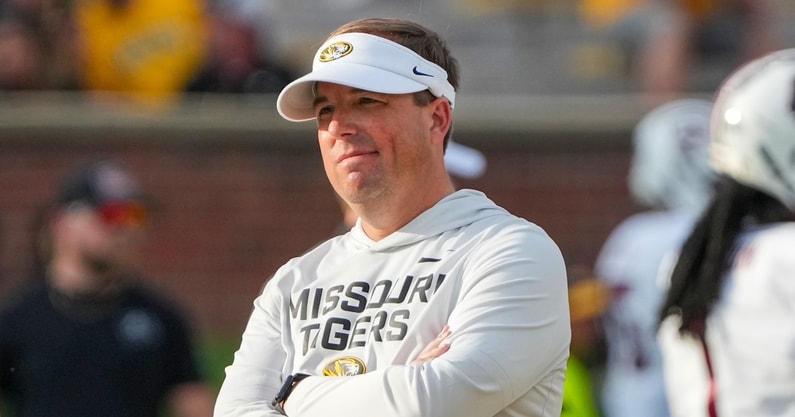Eli Drinkwitz continues railing against College Football Playoff selection committee

Missouri coach Eli Drinkwitz wasn’t much in the mood for big-picture, non-football questions during his SEC teleconference call on Wednesday afternoon. But a a College Football Playoff question got him going anyway.
Drinkwitz circled back to a point he has been banging on for months now when asked about the likes of Texas A&M not moving up after a recent road win or Alabama dropping several spots after losing to a ranked Oklahoma team. Mainly, he bemoaned the current setup.
“I love the question, man. I appreciate the question,” Drinkwitz said. “I’m going to refer back to my Southeastern Conference Media Days, when I railed against the fact that we are allowing human bias in a committee to determine who are the participants in a College Football Playoff. The game is played on the field.
“We have teams that played against each other and we don’t even count that. They both have the same record. They played against each other. We don’t count that as a factor. I mean I don’t know what to tell people other than human bias is in it and it does not have to be; It’s implicit, it’s not on purpose, but it just is. I don’t know that we’re ever going to have anything other than this.”
The head-to-head argument appears to be a case for No. 13 Miami to rank above No. 9 Notre Dame in the College Football Playoff rankings. The committee argued the two teams aren’t close enough together yet to be evaluated head-to-head.
Of course, Miami won the prior meeting between the two teams this season. And both teams sport two losses. The ambiguity of it all led Drinkwitz to make a proclamation.
“And you know what? Maybe the reality of it is it’s all just entertainment anyway,” Drinkwitz said. “I mean why in the world are we doing six weeks of projections on a playoff? It’s just entertainment. So maybe we’re the ones screwed up. Maybe we should just be enjoying the entertainment factor of it all instead of actually thinking that they’re trying to decide what the best teams are.”
Top 10
- 1Breaking
College GameDay picker
USC at Oregon guest out
- 2Hot
NSD Predictions
Calling the shot on top recruits
- 3
Auburn QB1
Tigers expected to make change
- 4Trending
Ole Miss
Kiffin to affect CFP seeding?
- 5
NCAA
Pushback on pro sports betting
Get the Daily On3 Newsletter in your inbox every morning
By clicking "Subscribe to Newsletter", I agree to On3's Privacy Notice, Terms, and use of my personal information described therein.
Drinkwitz was then pressed on whether the College Football Playoff in its current setup incentivizes coaches to run up the score and create large margins of victory. Coaches feel the need to get an edge any way they can, not knowing exactly how the other variables are going to shake out.
“If you do, if that’s what has to be done, they are ruining the game of football,” Drinkwitz said. “Football is about sportsmanship, it’s about player safety. Having people run into each other at high-level collisions repeatedly when the game is already done is stupidity, because they also factor in injuries.
“I think the committee also left out an undefeated Florida State team because a quarterback got injured. But then they also want you to run up the score and not protect your guys from injury, too. Again, the level of inconsistencies that have been created is hard to ignore and we were all given the promise that there was going to be a strength of schedule metric factored in. Didn’t happen.”
It’s all very simple when it comes to the College Football Playoff for Drinkwitz. The committee approach is far too subjective.
“The only way to solve this and make it real is for there to be play-in games and the teams win or lose on the field,” he said. “I think all of us as coaches, competitors, can lay our head on the pillow knowing it was decided on the field, instead of back room where deals were cut and nobody knows what’s being discussed.”